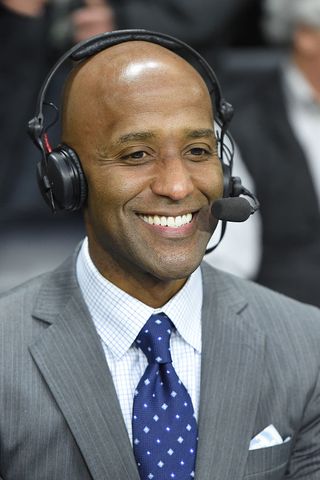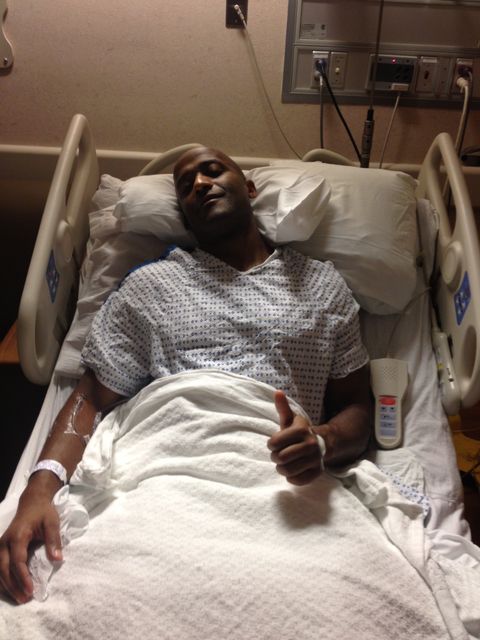The sportscaster did everything right: he ate well. He exercised. He was a black belt in Tae Kwon Do. Then his life changed forever.
Brian Custer lives for sports broadcasting. You've probably seen him during a halftime show or heard his voice calling a college or BIG3 basketball game on FOX Sports. Boxing is his specialty. He's a Showtime Boxing Championship host, providing commentary on competitors duking it out in minute-long battles for world titles. But a few years ago, he was in a battle for his own life against prostate cancer.
In 2011, Custer went to a health fair at his job. The emails promoting the fair kept encouraging men of color over 40 to get a prostate screening. At the time, Custer was exactly 40.
“I didn’t even know what my prostate was,” Custer tells MensHealth.com. “But I did it. It was uncomfortable. I had to drop trou, turn around, put my elbows on a chair. When I left the building, I walked straight to the Diamond District and bought myself a Rolex for the first time. I just needed to treat myself.”

Custer got a PSA (prostate-specific antigen) test, which is used to measure a protein produced in the prostate gland. The American Cancer Association recommends that men get their first PSA test at age 50, but men at high risk (including African-American men, or men with a family history of prostate cancer) should get a PSA at age 40 or 45.
Custer's test results came back normal. Then, in 2013, when Custer was 42, his doctor insisted that he get another PSA test. "I was like, no man, I [just] got one done, everything was fine…I just couldn’t bring myself to do it again," he says. But he relented.
"I'm always at the gym. I eat really well. I'm a second degree black belt in Tae Kwon Do. How could this old man's disease be happening to me?"
This time, when the test came back, Custer's number was a 5.4, which was alarmingly high. (Most doctors consider levels of 4.0 or lower as normal.) After doing a digital rectal exam and finding a bump on Custer's prostate, Custer's doctor scheduled for a biopsy. When the results came back, his doctor wanted to talk about them in his office. Custer knew that couldn't be good.
"I hadn't told my wife or anybody else about what was going on. I didn't want to scare or worry anyone. But now I was scared," he says. The news hit him like a brick.: "My doctor's exact words were, 'You’ve got cancer, and it’s fucking aggressive. We need to do something right now."
Custer was in shock.
"I was 42 years old. Super healthy. I'm always at the gym. I eat really well. I'm a second degree black belt in Tae Kwon Do. How could this 'old man's disease' be happening to me?" he says.

Custer was told that surgery to remove his prostate was his only option.
"I've never had surgery in my life. I asked if there was some other kind of treatment, and my doctor told me that if I didn't have [surgery], I'd be dead in a year," he says.
Now that the diagnosis was confirmed, Custer had to make the necessary calls to his family members. "My wife had the most to take in," he says. "All of it came out at once: that I had been seeing a doctor about my prostate, that I had cancer, and that my doctor said I was gonna die if I didn't get it treated. It was one of the hardest days of my life," he says.
"My doctor told me that if I didn't have [surgery], I'd be dead in a year."
Custer underwent surgery in August 2013. It went off without a hitch, but recovery was tough.
"They have to cut through your abs to get to your prostate. I had a drain on one side and one on the other side and a catheter. But there was no way I was gonna be laid up in the hospital," he says. After the surgery, he was anxious to regain his strength."Generally guys don’t go back to work for a few months. But I was back on the air in, like, 3 weeks," he says.
He says his fitness routine was crucial to his rapid recovery. "My marital arts instructor came over to visit and said, 'You’re a martial artist, you're mentally tougher and physically tougher than anybody. He had me using 2-pound and 5-pound little kettle bells. He said, 'Even if you have to sit on your couch and arm curl these, try to do these little squats with 2 pounders. So that's what I did."
Custer also did Kegel exercises to regain strength in his pelvis and help him fend off incontinence, a common side effect of prostate cancer surgery. He was initially worried that he would experience erectile dysfunction, another common side effect of the procedure, but "my doctor was very honest that he wasn't going to snip any nerves, that he wanted me to have a very happy and healthy sex life," he says.

To help raise awareness, Custer often tweets photos of his PSA tests, which he gets every 3 months. One of his friends who saw his tweets was inspired to get a PSA test for the first time in his life; he was diagnosed with prostate cancer, and is having surgery later this month.
Last February, Custer underwent preventative radiation therapy after his PSA levels began to rise again. "I did 39 treatments of radiation. Just because your prostate is removed doesn't mean I can never get cancer again," says Custer. He was still able to work while getting treatments, and his most recent PSA test came back to show that he is now cancer-free.
Got my PSA checked today by @drdavidsamadi and if you’re 40 or older, you should get yours checked as well.
September is Prostate Cancer Awareness month!!#getchecked #itcansaveyourlife#september #ProstateCancer @PCFnews
"My doctor said, 'I see too many guys like you. They want to hide in shame. They're embarrassed to go to the doctor and get a digital rectal exam.' And I get it," he says. "Initially, I felt shame. But I’m no different than anybody else. I want to spread the word and tell men to get checked."
Custer is especially interested in refuting the stereotype that prostate cancer is an "old man's disease." Although two-thirds of men diagnosed with prostate cancer are 65 or older, the risk of getting it at a younger age significantly increases if you have a family history of prostate cancer or are a man of color.
"It's really affecting us at a younger age, and the younger you are, the more aggressive the cancer is," Custer says. "Men of color are 70% more likely to get prostate cancer than white males, and twice as likely to die from it. I [felt like I had] to get this message out."
The experience has made him even more grateful for his health today.
"I remember the first time the doctor said I could go outside and walk. I just walked up and down our street," he recalls. "It was August and unbelievably hot, but I just remember how good the sun felt on my skin. When you face death, you really notice a lot of things that you took for granted in the past. I could just sit here and let the sun shine."



